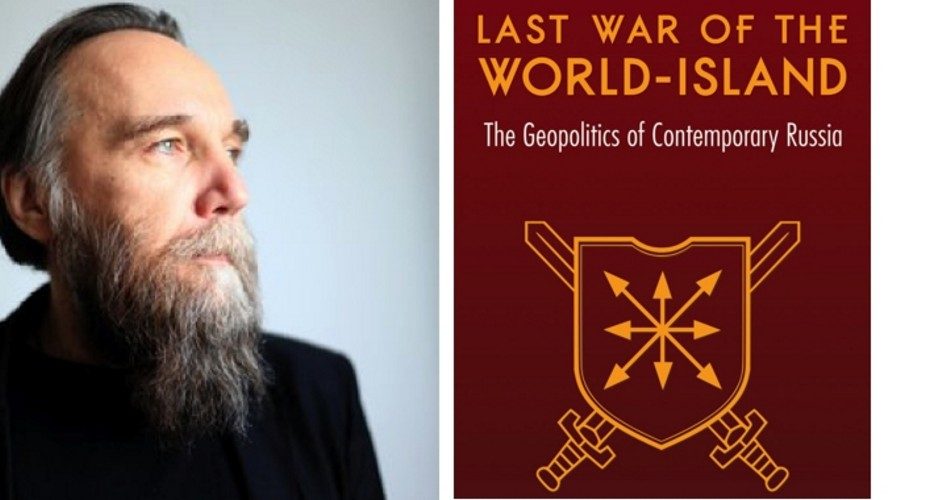
Although Western analysts continue to debate the motivations of Russian President Vladimir Putin for forming his Eurasian Union, what is undeniable is that the most vocal proponent of this union is Aleksandr Dugin (shown). Dugin laid much of the ideological framework for a Eurasian Union when Putin was just beginning to emerge in the upper echelons of the government of the Russian Federation, and Dugin has been as outspoken in his ideological agenda as Putin has been taciturn in revealing his own. In fact, when Dugin’s remarks concerning Russia’s involvement in Ukraine were widely interpreted as advocating a genocidal campaign against Ukrainians who would oppose Russian occupation of portions of that country, Dugin lost his teaching position at Moscow State University and was eventually placed under sanctions by the U.S. Department of the Treasury.
As this reviewer has noted in previous reviews of Dugin’s books — Putin vs. Putin and his Fourth Political Theory — Aleksandr Dugin views the confrontation between the United States and Russia in no less than apocalyptic terms and has sought to frame the contest between the two countries as the latest phase in an ancient war between the “powers of the Sea” and “powers of the Land.” One of Dugin’s most recent books to be translated into English is Last War of the World-Island — The Geopolitics of Contemporary Russia, and in this book, the author continues to advance this apocalyptic theme. In Dugin’s words, “This geopolitical meaning remains, on the whole, unchanging in all later stages of Russian history: from the Muscovite Czardom through the Romanov Russia of Saint Petersburg and the Soviet Union to the current Russian Federation. From the fifteenth to the twenty-first century, Russia is a planetary pole of the ‘civilization of the Land,’ a continental Rome.” Dugin attempts to give a scientific cast to his categorizations by declaring the “civilization of the Land” to be a tellurocracy, while the “Anglo-Saxon world … ‘the civilization of the Sea’” he deems to be a thalassocracy. Dugin’s Eurasianist distinction between these two categorizations thus replaces all other ideological distinctions across the whole sweep of the modern era; in his Eurasianist ideology, the enduring conflict is not national or economic, but a battle between ideological agendas framed by the “Land” and “Sea.” In Dugin’s assessment, Russia’s role as the “civilization of the Land” has “preserved a verticle, hierarchical, ‘messianic’ structure of government.” Whatever the ideology, for Dugin, “Russia moved toward world dominance”:
Sometimes the territory of Rus contracted for a short period, but only to expand again in the next stage. Thus beat the geopolitical heart of the Heartland, pushing its power, its population, its troops, and other forms of influence to the outer edges of Eurasia, all the way to the coastal zone (Rimland). The living, beating, and growing heart of the world’s land-based empire predetermines Rus-Russia’s path toward the establishment of a world power and one of the two global poles of the world.
Under various ideologies and political systems, Russia moved toward world dominance, having firmly embarked on the path of establishing control over Eurasia from within and from the position of the center of the inner continent. (p. 139–140.)
Dugin interprets the entire Soviet era not in terms of Marxism-Leninism, but of Eurasianism against the “civilization of the Sea,” and declares Joseph Stalin to have been a hero of Eurasianist ideology:
Stalin was a classic figure in the tradition of the great-continental leader, exactly suited for both the scale of the geopolitical tasks standing before Russia in the twentieth century and for the sociological constants of Eurasian tellurocractic sociology, oriented toward hierarchical, vertical, “heroic,” and “Spartan” values. It is difficult to say whether he was thoroughly familiar with the ideas of the Eurasianists and the National Bolsheviks and whether he had a precise notion of geopolitical patterns. Anyhow, a precise and distinct logic is visible in his foreign policy. Each action was directed toward strengthening the power of the civilization of Land, expanding the Soviet government’s zone of influence, and defending strategic interests. During his rule, a consistent Eurasian geopolitical policy was consciously implemented.
Just as Vladimir Putin has spoken of the collapse of the USSR as the “greatest geopolitical catastrophe of the twentieth century,” so, too, Dugin saw the end of the Soviet Union not in terms of Marxism-Leninism contending with the West, but as a crucial battle of the Eurasianist “Land” against the Atlanticist “Sea”:
Geopolitically, the disintegration of the USSR signified an event of colossal importance, affecting the entire structure of the global geopolitical map. According to its geopolitical features, the confrontation of the West and East, the capitalist and the socialist one, was the peak of the deep process of the great war of continents, a planetary duel between the civilization of Land and the civilization of the Sea, raised to the highest degree of intensity. All preceding history led to the tense apogee of this battle, which reached its qualitative resolution in 1991. Now, with the death of the USSR, the collapse of the civilization of Land was realized, the bulwark of tellurocracy fell, and the Heartland received a fatal blow. [Emphasis in original.]
The collapse of the Soviet Union is framed in terms of an imagined victory of ancient Carthage over Rome — an event which Dugin styles as heralding the advent of Antichrist:
Mercantile civilization prevailed over a heroic, ascetic, and Spartan civilization. The putrid spirit of plutocracy proved stronger than the perplexed and confused “Romans” of socialism, who had lost their vigilance. Significantly, Chesterton ties Rome’s victory over Carthage to such events unique to Christianity as the birth of Christ in the Roman empire, a land civilization. By this logic, only the Antichrist could have been born in a sea civilization. [Emphasis in original.]
In Dugin’s assessment, the rise of Vladimir Putin and his Munich speech in February 2007 signaled a revival of the “civilization the Land” and a renewal of the conflict:
The reaction to Putin’s Munich speech in the West and the USA was extremely negative. The majority of Atlanticists and experts began to speak of a renewal of the “Cold War.” Putin showed that he realizes that the great war of continents has not ceased and that today we are only in its next stage….
If we grant that Putin spoke sincerely and deliberately in his Munich speech, then, in contrast with how little resonance his words received in Russia itself and how little they affected domestic and foreign policy, we must think that he is a continentalist, a Eurasianist, and a supporter of strong governmental authority, but among a dense ring of Atlanticist, American agents of influence, effectively sabotaging those of his serious initiatives which might harm their overseas masters. (p. 124-5, italics in original)
Invocations of “saboteurs” and shadowy circles of “American agents of influence” is simply an attempt to reheat the old propagandistic terms that Stalinists invoked to justify the “show trials,” with all difficulties hampering “the Leader’s” agenda being the fruit of such malign influence. In Dugin’s opinion, what is needed is “a strong-willed and energetic personality at the head of government, a new type of ruling elite and a new form of ideology.” As noted in the review of Putin vs. Putin, what seems ambiguous is whether Putin will be able to live up to Dugin’s expectations for the leader.
Last War of the World-Island lives up to Dugin’s earlier Jeremiads, insisting that Russia must not be allowed to live at peace with its neighbors; rather, the only choices he seems to consider are either expansion or decline:
Russia will not be able to become a “normal” country by inertia and without effort. If it will not begin a new cycle of ascension, it will be helped in entering a new round of decline. And if this happens, then it will be impossible to sway on what stage the recurrent cycle of fall, crisis, and catastrophe will end. We cannot rule out the disappearance of our country from the map; after all, the great war of continents is the genuine form of war, in which the price of defeat is disappearance. … Therefore, we should look toward the future with reasonable optimism and create this great-continental Eurasian future for Russia with our own hands.
Taking into account Putin’s ongoing aggressive stance against Ukraine and his establishment of the Eurasian Union, it is perilous to dismiss Dugin’s views out of hand. In the past, Dugin’s ravings have offered a window into some rather disturbing corners of post-Soviet ideology, and his enduring influence and significance in the Putin era cannot be ignored.
Aleksandr Dugin, Last War of the World-Island — The Geopolitics of Contemporary Russia (London: Arktos, 2015). ISBN 978-1-910524-37-4. 152 pages. paperback.



